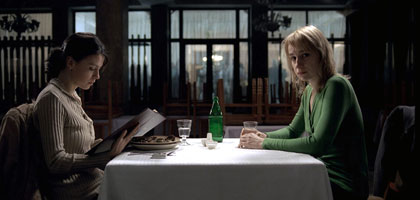Primary navigation


Ben Walters applauds the way Cristian Mungiu's drama about abortion in communist Romania mixes profound sympathy for its characters' ordeals with an eye for the grim absurdities of the society they live in.
If it's not too late to think in terms of national cinemas, Romania's is in the ascendant. But that its current success depends largely on foreign money and international acclaim might suggest we have in fact moved beyond such delineations; certainly the six prizes the country has won at Cannes since 2004 have provided a tremendous, perhaps essential, industrial lubricant. The latest and most celebrated of these was the 2007 Palme d'Or for Cristian Mungiu's 4 Months, 3 Weeks and 2 Days, a story set late in the Ceausescu era about the efforts of undergraduate Otilia (Anamaria Marinca) to see her friend Gabita (Laura Vasiliu) through an illegal hotel-room abortion. A technical tour de force, gripping in its awful banality and not without deadpan wit, the film works as a companion piece to Cristi Puiu's The Death of Mr. Lazarescu (winner of Un Certain Regard in 2005); together, they form mordant bookends to life, stringent redresses to sentimental fantasies of birth and death.
Each strikes a sophisticated balance between the acute, humane sympathy with which their characters' ordeals are charted and a knowing distance: there's the dramatic irony of the titles, for instance, which give us information unknown to the characters (Gabita herself is unsure of the length of her pregnancy), and the sardonic resonance of the names (where 'Lazarescu' travesties 'Lazarus', Mungiu gives us an abortionist called 'Bebe'). Like Lazarescu, 4 Months examines a psychological and physical degradation resulting from social and political contingencies, but rather than lecturing, these films make witnesses of their audiences. Using lengthy takes to describe a story that unfolds over a matter of hours, they have a compelling unity of time and space. Cleverly, we share 4 Months not with the pregnant Gabita - who seems perilously naive as well as petrified - but with her more streetwise friend Otilia, whose trajectory illustrates both the dodges and barters necessary for survival in this bereft society and the high cost of assuming responsibility.
Mungiu's technique is simple and rigorous, with scenes composed of only one or two shots; his DoP Oleg Mutu also worked on Lazarescu and on Mungiu's only other feature, Occident (2002). In dorm, hotel and living rooms, on buses and streets, the camera often pans 270, even 360 degrees around a scene, with the soundtrack including dialogue from unseen sources. Some of these shots are handheld, mobile, almost literally breathtaking: at one point we join Otilia on her increasingly anxious journey from her boyfriend's parents' home, out of the building, across an overpass, on to a bus and back to the hotel room where Gabita might, for all we know, be fatally haemorrhaging. By the time she gets there, we're practically out of breath.
Elsewhere, the absence of movement is even more powerful. In his more professional-minded moments, the abortionist Bebe (Vlad Ivanov) repeatedly stresses how important stillness is to the success of their enterprise; Mungiu and Mutu's regular use of locked-off shots lasting many minutes would suggest they agree. When Bebe leaves the hotel room, the waiting begins: a shot from Gabita's point of view shows her belly, her knees and, across the room, the friend who has just prostituted herself to ensure the abortion goes ahead. They are silent for a long while; what could be said? Otilia and Bebe's sex, like much of the action, takes place (not far) off-screen, and after Otilia's submission another long take yields a curiously beautiful composition: the back of her blonde head, above her pea-green top, before the blue-white tiles of the shower in which she tries to lose herself. Later comes a shocking shot of the aborted foetus on the bathroom floor, filmed from a jarringly low, close vantage point, making it appear large and near.
The technique's greatest triumph comes with the dinner Otilia attends for her boyfriend's mother's birthday. Having left Gabita alone in the hotel room with the phone number of the apartment, Otilia is fixed at the end of the table, mute, in a tightly framed shot around whose edge buzzes facile chatter. As she endures this, the ringing of the unanswered phone, and the conflicting emotions percolating within her, the minutes tick agonisingly by and an eruption threatens. Exploiting to the full the tension between mise en scène and voices off that runs throughout the film, it's quite the most nerve-wracking scene I've witnessed all year, and a remarkable achievement on the part of actor Anamaria Marinca. (A comparison might be the torturous shot of two characters waiting in water in the Dardennes' L'Enfant, another social-realist Palme d'Or-winner in which a feckless young adult buckles under prospective parenthood.)
Mungiu demonstrates great proficiency with suspense throughout. The opening 20 minutes, before the nature of Gabita's quest becomes apparent, evoke a growing, unspecified unease, while the director has aptly described the "thriller rhythm" of the final phase in which Otilia sets out to dispose of the foetus without incriminating herself. There are elements of noir to this guilty nocturnal sequence, which is bathetically foreshadowed near the beginning when Otilia narrowly evades a fine for travelling on the bus without a ticket. Amusing as the earlier scene is, it sets the tone of a life of near misses and tentatively offered bribes.
Unlike Lazarescu, after all, 4 Months is located in the past. The death throes of the Ceausescu regime have formed the backdrop to several Romanian titles - The Paper Will Be Blue, How I Spent the End of the World and 12:08 East of Bucharest - but 4 Months unfolds in its dog days, a drab, stagnant late-communist milieu partly familiar from Germany's Good Bye, Lenin! and The Lives of Others. There's no whiff of real resistance, let alone revolution, in the air, merely a Sisyphean bracing against the machinery of the state. As with the characters and narrative, the 1980s setting is conveyed through telling local detail - such as the boy in the shabby-genteel dorms who does a reliable trade in western cigarettes, gum and VHS cassettes.
Period detail can be an easy source of comic relief, but the humour in 4 Months is of a sharper, darker kind. The desperate absurdity of the characters' situations often bypasses amusement: Gabita's blithe naivety might have been entertaining had it not yielded such grim circumstances; when Otilia's boyfriend criticises her for forgetting to bring flowers for his mother, we might manage a single hollow chuckle at the gulf between his concerns and hers. There's bleak irony in the fact that the hotel they use for the termination is booked out for a wedding, that the reception turns into a punch-up or in the serving up of its heaped meat platter to Gabita and Otilia in the final scene. Even as he crafts a story of sympathetic power, Mungiu is alive to the absurd and the ironic. This, after all, is the first in a planned series of films set in the 1980s, called 'Tales from the Golden Age'.